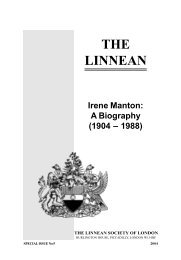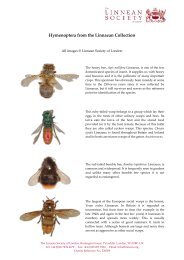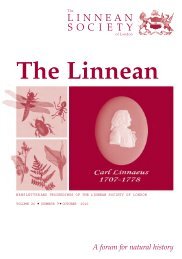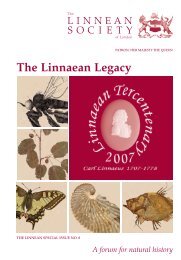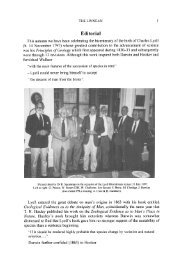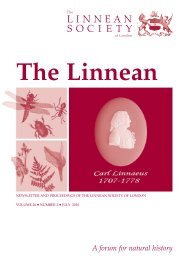Vol 25, no 3, October - The Linnean Society of London
Vol 25, no 3, October - The Linnean Society of London
Vol 25, no 3, October - The Linnean Society of London
You also want an ePaper? Increase the reach of your titles
YUMPU automatically turns print PDFs into web optimized ePapers that Google loves.
32<br />
THE LINNEAN 2009 VOLUME <strong>25</strong>(3)<br />
means, a Cambridge graduate and, for five long years, had been the sailing companion<br />
<strong>of</strong> the aristocratic FitzRoy. In short, Charles Darwin was ‘blue chip’ Establishment<br />
yet he had begun asking those questions whose answers, whatever the final technical<br />
details turned out to be, he knew full well had the potential to blast away the foundations<br />
<strong>of</strong> that very society <strong>of</strong> which he was a member. Of course, having independent means<br />
meant that he did <strong>no</strong>t require either approval or patronage from anyone and yet, as a<br />
human being, neither did he seek to attract opprobium. He took pains to distance both<br />
himself and his nascent theory from any associations with the radical Left. <strong>The</strong> idea <strong>of</strong><br />
evolution, as distinct from its various postulated mechanisms, had been ‘in the air’ as<br />
Lyell put it, for nearly a century. Unfortunately its proponents had been those very<br />
maverick thinkers from whom Darwin wished to disassociate himself. One such<br />
maverick was William Lawrence whose book Lectures on Physiology, Zoology and<br />
the Natural History <strong>of</strong> Man (1822) had been de<strong>no</strong>unced as blasphemous and associated<br />
with the writngs <strong>of</strong> the ‘Infidel’ Tom Paine. It was refused copyright by the Lord<br />
Chancellor and was, <strong>of</strong> course, pirated (Darwin had a copy) and became hugely popular.<br />
Nevertheless it ruled out the possibility <strong>of</strong> ‘Evolution’ being judged dispassionately.<br />
To make matters worse Lawrence had been inspired by the works <strong>of</strong> Darwin’s own<br />
Grandfather, Erasmus, whose writings conveyed a suspicious scent <strong>of</strong> atheism and, as<br />
for his erotic botany….. In addition, the infamous ‘Vestiges’ was to give Darwin pause.<br />
Darwin thought <strong>of</strong> himself primarily, at least to start with, as a geologist and, on<br />
his return from the Voyage much <strong>of</strong> his work was geological and he became closely<br />
associated with his idol, Charles Lyell and with the <strong>London</strong> Geological <strong>Society</strong> with<br />
its ‘<strong>of</strong>ficial’ inductive or Baconian approach, a philosophy which Darwin claims to<br />
have adopted in his work on evolution. This was in sharp constrast to his Grandfather,<br />
Erasmus’ work in which, says Darwin ‘...the proportion <strong>of</strong> speculation being so large<br />
to the facts given.’ (AB p.49). Darwin wanted his theory to be seen to arise de <strong>no</strong>vo<br />
from objective observations unsullied by presuppositions and speculation. It wasn’t<br />
to be. Is it any wonder that he had his wife, Emma, place the 1844 Essay under lock<br />
and key, avoided the word ‘evolution’ and made only passing reference to man’s descent<br />
in the Origin? Darwin had become a reluctant subversive, a ‘Fifth Columnist’<br />
masquerading as a respectable country gentleman. Whether this ‘mimicry’ was, in the<br />
end, Batesian or Mullerian is, perhaps, an issue future historians may wish to debate.<br />
However, whether he liked it or <strong>no</strong>t Darwin’s theory was, as T.H. Huxley put it, to<br />
become ‘a veritable Whitworth gun in the armoury <strong>of</strong> liberalism’. (Huxley’s review<br />
<strong>of</strong> the Origin in Westminster Review NS 17 1860 pp.541-70. Quote p.541)<br />
No one, including Charles Darwin, can totally divest themselves <strong>of</strong> the beliefs<br />
which are part <strong>of</strong> their upbringing. One such belief was the doctrine <strong>of</strong> the fixity <strong>of</strong><br />
species and the trials and tribulations which Darwin underwent to dispose <strong>of</strong> it – ‘it is<br />
like confessing a murder’– have been fully, if <strong>no</strong>t over, documented. It seems, in<br />
retrospect, that neither Darwin <strong>no</strong>r his biographers need have borne such a burden,<br />
because Ron Amundsen has convincingly argued that the fixity <strong>of</strong> species, as an idea,<br />
goes back only as far as Linnaeus, who used it as a taxo<strong>no</strong>mic tool in his search for a<br />
‘Natural Classification’. It never was, it seems, a Divine edict. However, it is fair to<br />
speculate that, if Darwin had <strong>no</strong>t begun with this apparently ‘Straw Man’, Evolution<br />
and Natural Selection would have been still-born!



